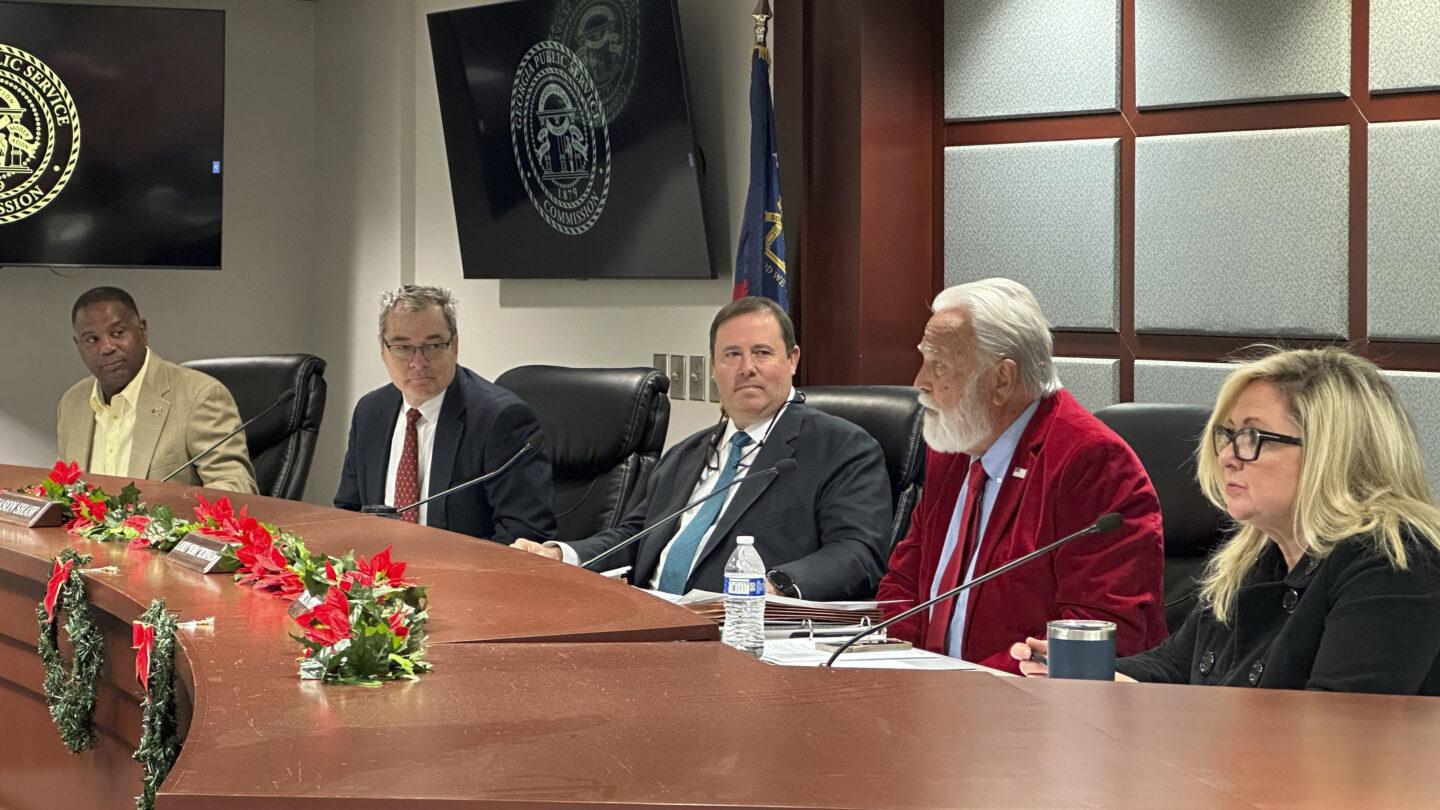Who controls the power? The overlooked officials who have say over Georgia Power's policies and prices

The five Republican members of the Georgia Public Service Commission discuss a rate increase for Georgia Power Co. to pay costs at the utility’s Vogtle nuclear power plant, Dec. 19, 2023, in Atlanta. (AP Photo/Jeff Amy, File)
This story is part of a collaboration with Grist and WABE to demystify the Georgia Public Service Commission, the small but powerful state-elected board that makes critical decisions about everything from raising electricity bills to developing renewable energy.
On a Tuesday morning in January, college student Aurora Gray stepped up to the podium in a windowless room in Atlanta, around the corner from the state Capitol building. In front of her sat a five-member panel of elected officials that oversees how and where many Georgia residents get their power.
“The generation of energy … using fossil fuels has become an existential threat to our safety due to the undisputed impacts of greenhouse gas emissions on our planet,” Gray told the commission. “We must act now, as later is way too late.”
More than a dozen other students sat behind her, awaiting their allotted three minutes in front of the Georgia Public Service Commission (PSC). One after another, they called on the commission to reject a request from Georgia Power, the state’s largest utility, to add new natural gas capacity to the grid. Instead, they repeated at the podium, they want the company to expand renewable energy and take other steps to combat climate change.
“You can help get Georgia Power to take the right actions in the essential timeframe,” said high school senior Evelyn Ford, the last of the students to speak across two days. “Actually, you’re the only five people in Georgia who can.”
Ford is substantially correct. The PSC is the only government body with direct authority to regulate whatever Georgia Power does.
The panel sets the rates people pay for electricity and approves the utility’s plans to make or buy that power and deliver it to customers. Georgians routinely attend PSC rate-setting hearings to plead with commissioners not to raise rates, sharing stories of high bills and hard choices between paying for power and other essentials like food and medicine.
“This is real. Life is real,” Shemika Simmons of Savannah told the commissioners during rate hearings in 2022. “When rates go up, lights go out.”
According to the commission’s own website, “very few governmental agencies have as much impact on people’s lives as the PSC.”
There is a small panel of regulators in every state that holds a similar power over electricity generation and, by extension, an enormous segment of the United States’ greenhouse gas emissions that are warming the planet. By setting electricity prices, they also substantially impact people’s lives and pocketbooks.
Yet, in Georgia and elsewhere, these groups — known as public service or public utility commissions — often get little attention or scrutiny outside of energy wonk circles. Their hearings and documents tend to be long and jargon-heavy, covered in the media by a small group of specialized reporters, making it hard to engage with the process.
But these utility regulators are powerful decision-makers who could change the course of U.S. emissions and have a direct impact on Americans’ personal finances.
This year, Grist and WABE will try to demystify energy regulation in Georgia and beyond. We’ll bring you stories on not only how your power gets made, but how those decisions happen — and how residents who vote and pay electricity bills can get involved.
How the Georgia PSC makes decisions
The Georgia Public Service Commission was established in 1879, first as a government body to regulate railroads and later expanded to address the services popping up in an increasingly electrified and connected state. Today, the PSC oversees investor-owned utilities, as well as natural gas pipelines and telecommunications.
Georgia has 42 member-owned cooperatives and 52 municipalities that provide electric service to residents. But Georgia Power is by far the state’s largest electricity provider, serving 2.7 million customers from the Tennessee border to the coastal islands. It is also Georgia’s only investor-owned electric utility — meaning it is the only power company whose rates and operations the PSC directly oversees. For Georgia Power’s residential customers, it’s their only option to buy electricity.
At the core of the commission’s oversight of Georgia Power are two main decision-making processes: the integrated resource plan and the rate case.
Go deeper: Your guide to electricity and energy policy in Georgia
Every three years, the utility updates its 20-year plan for making and delivering electricity. That roadmap is called the integrated resource plan (IRP). This involves forecasting how much power Georgia Power’s customers will need and laying out what combination of resources — coal and gas plants, nuclear energy, solar fields, hydroelectric dams and purchase agreements with other utilities — Georgia Power will use to meet that demand. It also evaluates anticipated updates and maintenance to the company’s system of transmission lines, transformers and other infrastructure that delivers power.
As of 2022, the last time the PSC approved an IRP, Georgia Power still got its energy mostly from fossil fuels: 48% natural gas and oil and 15% coal. Nuclear energy accounted for another 23%, with 7% coming from renewables — mostly solar — and 2% from hydropower. More nuclear has come online since then, but the company has also asked to build new gas turbines.
Once an IRP is approved, the commission conducts a rate case to determine how much Georgia Power’s customers pay for their electricity.
There are a lot of opportunities for input before the PSC decides on IRPs and rate cases. Along with public commenters like Simmons and the group of students earlier this year, a subset of PSC employees, known as the Public Interest Advocacy staff, advocate for ratepayers’ interests in the hearings. Other organizations, including environmental and consumer advocacy groups, major electricity buyers and cities, can engage in the hearings as well. These stakeholders and the Public Interest Advocacy staff present expert testimony and cross-examine one another’s witnesses as well as Georgia Power’s representatives.
Often, the commission’s Public Interest Advocacy staff strikes a deal with Georgia Power that resolves most of the issues in an IRP proceeding or rate case. But the final decision ultimately rests with the five commissioners, who can approve or deny an agreement and can amend it before voting.
How the Georgia PSC determines power bills
The PSC makes several kinds of decisions that appear on consumers’ energy bills, including rates for the power they use, a rider to cover fuel costs and other fees.
The largest portion of a typical Georgia Power bill is the usage, or how many kilowatt-hours of energy the customer used that month multiplied by the rate set by the PSC. A lot of costs go into that rate: making electricity at power plants, transmitting it to customers via power lines, maintaining and repairing those lines, providing customer support, running assistance programs and much more that the company does.
Georgia Power is also allowed to pass on to customers the cost of building and maintaining the infrastructure approved in the IRP, as long as the PSC signs off on it. When the first of the new nuclear reactors at Plant Vogtle entered service in 2023, for instance, rates automatically increased to pay for construction costs the PSC approved — a jump of about $5.46 per month for a typical residential customer. Rates will ratchet up again by just under $9 when the second reactor goes online.
As an investor-owned company, Georgia Power also aims to make a profit. The commission decides how much it can make by setting a figure in the rate case called “return on equity.”
That last point is often a contentious one. The commission, by its own description, “must balance Georgia citizens’ need for reliable services and reasonable rates with the need for utilities to earn a reasonable return on investment.”
But the company’s profits rankle many Georgians who face a high energy burden, meaning they spend a high proportion of their income on energy. Atlanta ranks fourth in the country for its median energy burden, and third for energy burden among low-income households, according to an analysis from Georgia Tech.
“Tell them they make enough profit,” former Democratic state Senator Vincent Fort urged the commission during Georgia Power’s last rate case in 2022. “Tell them that you are standing up for regular folk.”
All told, that rate case resulted in a series of three rate hikes for Georgia Power customers: on January 1 of 2023, 2024 and 2025. At the urging of the PIA staff and many intervenors, the final rates the PSC approved are distributed differently than the utility originally asked for.
So between 2023 and 2025 there are six planned bill increases for Georgia Power customers: three stemming from the rate case, two for Vogtle construction costs and a third to cover higher-than-expected costs of natural gas. That natural gas rider, known as fuel cost recovery, is the single biggest increase applied to customer bills out of the six.
Much as the utility is allowed to recover its construction and maintenance costs from customers, it’s also allowed to recover the cost of fueling power plants, mostly with coal and natural gas. The company does so by estimating that cost and collecting it, then adjusting after the fact. Sometimes fuel prices are unexpectedly low, and customers get some money back. But the spikes in natural gas prices over the last few years meant that in 2023, Georgia Power found it had collected too little to pay for fuel. The PSC approved the company’s request to tack that shortfall onto customer bills. The increase amounted to about $15.90 for a typical customer.
This is another point of contention in how the PSC’s oversight of Georgia Power works: that the process deals with resources, rates and fuel separately even though those things are linked. During the hearings over fuel cost recovery in 2023, consumer advocates called for a more holistic process in which the commissioners would weigh coal and gas prices while they consider how much of Georgia Power’s electricity should come from coal and gas.
The same critique has arisen in the utility’s current request to build three new gas-fired turbines. Georgia Power is promising not to pass the construction costs on to residential customers. But critics of the plan say the cost of the gas itself isn’t being considered.
“It does not factor in fuel cost,” said Bryan Jacob of the Southern Alliance for Clean Energy. “That’s the biggest concern with continuing to expand our over-reliance on gas, is that it leaves ratepayers vulnerable to gas price volatility like we experienced in 2022.”
Power bills include smaller fees and charges as well, including sales tax and a fee to cover the cost of complying with environmental regulations. For over a decade, Georgia Power customers have paid an added fee of up to 10% every month to cover the costs of financing the Plant Vogtle construction, a charge approved by the PSC in 2010.
How the Georgia PSC’s decisions relate to climate change
The PSC has the authority to alter Georgia Power’s business proposals and dictate its energy mix — thereby significantly controlling the state’s greenhouse gas emissions. In fact, they already have.
In 2011, commissioner Bubba McDonald added 50 megawatts of solar power to Georgia Power’s generation mix. When the utility updated its IRP in 2013, the commission more than doubled the solar capacity that Georgia Power asked for. In subsequent IRPs, the commission continued to order more solar than the utility proposed.
By 2024, the state ranked seventh in the country for solar power, according to the Solar Energy Industries Association. Georgia’s emissions dropped by 5% from 2017 to 2021, and power generation dropped below transportation as the leading emissions source, according to the climate group Drawdown Georgia. Researchers credit the change to the shift in how Georgia makes its energy: coal plant retirements, transitioning to natural gas, expanding solar energy, increasing energy efficiency and some impacts from the early part of the pandemic.
But the PSC has also upheld and prolonged fossil fuel energy generation in Georgia. In the utility’s 2022 IRP, the commission approved six agreements to purchase natural gas power for more than a decade into the future over the objections of consumer and clean energy advocates. The utility also sought to shutter several coal plants, saying they would soon no longer be economical to run. But the PSC put off a decision on one of them, meaning the facility will keep burning coal for the foreseeable future.
How the PSC is elected
Five elected members sit on Georgia’s Public Service Commission. Each member represents a district where they’re required to live, but elections for the positions are statewide.
While some city offices have similar arrangements, this is an unusual system at the state level, according to UGA politics professor Charles Bullock. Georgia lawmakers devised it in the late 1990s, with the idea, according to its architects, that it would reflect the commission’s unique job regulating a statewide industry with local impacts. Former Georgia House Speaker Terry Coleman told WABE that lawmakers wanted to figure out “how we could make sure that places outside of the metro areas had representation.”
But civil rights and environmental activists contend that because the commissioners are chosen in a statewide vote, they don’t really represent the people in their districts. The commissioner for District 3, covering Metro Atlanta, for instance, is elected not just by Atlanta residents but by voters in rural South Georgia and the mountains of North Georgia — areas with starkly different demographics, politics and needs.
A recent lawsuit by a group of Black voters in Atlanta alleges this system violates the Voting Rights Act by diluting their votes, preventing them from seating the candidate of their choice on the commission.
“Representation matters,” plaintiff Brionté McCorkle, executive director of the group Georgia Conservation Voters, told WABE. “It’s the most important thing to have at least one person on the commission that represents the unique and particularized needs of your district.”
The Georgia Secretary of State’s office argued in hearings on the suit that the advantage the PSC voting system creates is political, not racial. This is a key distinction, because while the Voting Rights Act bans racial gerrymandering, the U.S. Supreme Court has held that election systems that favor a political party are allowed.
All of the current commissioners are Republicans. In a state where a third of residents are Black, two Black commissioners have served on the commission during its 145-year history. Both were appointed to fill vacancies and weren’t elected. Four of the five current commissioners were initially appointed to fill vacancies before running for reelection as incumbents.
Siding with the plaintiffs in 2022, a federal judge blocked that year’s elections for two seats on the commission and ordered that the system be redesigned. The 12th U.S. Circuit Court of Appeals reversed that decision in 2023.
The plaintiffs have appealed to the U.S. Supreme Court, though there’s no guarantee the Supreme Court will accept the case.
In the meantime, the commissioners who were up for reelection in 2022, Tim Echols and Fitz Johnson, continue to sit and vote on the commission. Another commissioner, Tricia Pridemore, is due to face reelection this year. But none of those races are on the 2024 ballot.
Under a bill that passed the Georgia General Assembly this year, elections for the seats held by Echols and Johnson would be held in 2025, with the other seats to follow in subsequent years. Critics have pointed out that this schedule would leave some of the current commissioners in office for as long as eight or nine years without facing voters, instead of their typical six-year terms. The bill is still waiting for Governor Brian Kemp to sign or veto it.
How other state energy regulators work
While these policies and procedures are specific to Georgia, some version of them plays out all over the country.
Every state has a public service or public utility commission that controls electricity. In some states, utility regulators are elected directly by ballot. In others, they’re appointed by elected officials, like the governor or state legislature. Many, though not all, states require their utilities to file IRPs that predict future demand for power and map out how the utility will meet that need.
What’s common nationwide is that the future of clean energy hinges on the decisions of these public utility commissions. Cities, states and companies can resolve to cut emissions, but if they buy power from a regulated utility, they don’t ultimately control how their power is made — the regulators do. Even the Department of Defense, with its $800 billion budget, is subject to the decisions of these commissions.
Utilities’ own climate change goals depend on these commissions. Southern Company, Georgia Power’s parent company, has announced plans to shutter most of its coal plants, but that plan can only move forward if approved by utility commissioners on the state level. Similarly, regulators approve or deny plans to build solar and wind farms, nuclear plants and battery storage facilities. If commissioners don’t prioritize clean energy, then climate goals set by companies or governments have little chance of succeeding.
Grist and WABE’s reporting over the next several months aims to examine these commissions and their outsized role in American households and climate policy. To ensure our stories reach and involve residents who face the biggest barriers to accessing accurate, consistent information, we are hosting workshops with community partners, creating printable resources, and launching a paid journalism training program. Subscribe below to receive email updates about this project.








